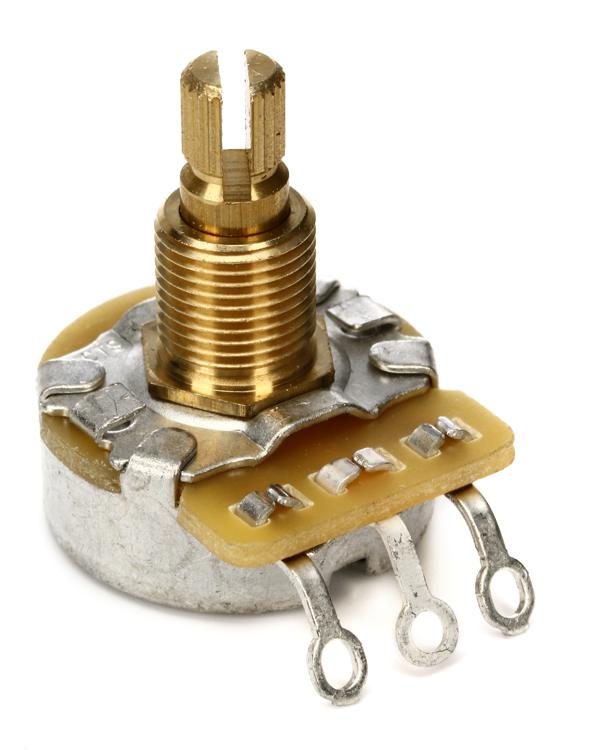
By Ed Malaker
Posted 08/24/2019
500k vs 1 Meg potentiometers — what’s the difference, and how do they affect your tone? To answer that, we’ll take a look at your guitar’s Volume and Tone controls and see how we can modify them, and, perhaps make some significant improvements. These parts are relatively easy to swap out, and the job only requires a few tools, but they do have a considerable impact on your final guitar tone. Many players might not realize that the values of the controls can affect how bright the sound is.
Tools Required
Phillips screwdriver
soldering iron
IMPORTANT: Never use a soldering GUN, only use a soldering IRON
How It Works
Your Volume and Tone controls are electronic devices called potentiometers. Often called a “pot” for short, a potentiometer is a variable resistor. As you turn your Volume or Tone up and down, you change the amount of resistance applied to the circuit housed in your guitar. The Tone and Volume controls are the same, but the Tone knob has a capacitor added to it.
How It Affects Tone
Both the Volume and Tone controls connect to Ground. This connection allows some of your high-end frequencies to leak to Ground, even when the controls are wide open. Frequency loss is not necessarily a bad thing, because many guitar pickups can be very bright and harsh sounding, and this gives you a way to tune them to your liking… sort-of.
Standard Values
Single-coil pickups are notoriously bright and can be harsh at times. It’s often desirable to allow more frequencies to escape to Ground, so these pickups are usually paired with 250k pots. For now, know that 250k pots allow more high-end frequencies to pass to Ground. 250k is the lowest value typically used and will result in the warmest tone.
Humbucker pickups use two coils and their proximity to each other causes phase cancelation. Phase cancelation is another cause of high-end frequency loss, and this causes humbucker pickups to sound much warmer than single coils. Because of this warmth, we customarily try to save more of the remaining high end and use 500k pots with humbuckers. 500k pots allow less high-end frequencies to pass to Ground and will result in a brighter tone.
Bass guitars are not concerned with high-end frequencies and use 250k pots almost exclusively for single-coil and humbucker pickups.
Higher Values Equal Brighter Tones
It might be easiest to think of the pots as a dam, and the high-end frequencies as water. The higher the value, the taller the dam. When less water spills over, the result is a brighter tone.
1 Meg Pot
There are plenty of values besides 250k and 500k, including the 1 Meg pot. This potentiometer is the equivalent of 1,000k, which is twice the 500k, and four times greater than 250k.
As you have probably guessed, the 1 Meg pot is going to give you an even brighter tone than a 500k pot. The sound will be very similar to the way it would sound with no controls and is about as brilliant a tone as we can get from this method.
2 Meg Pot
The 2 Meg pot equals 2,000k. This potentiometer is brighter sounding than the 1 Meg pot, but the difference is very slight, and most consider the 1 Meg to be the highest practical value.
500k vs 1 Meg Potentiometers: When to Use Alternate Values
The only one that can tell you which pots to use is you. You will need to use your ears and do a little experimentation. Many times, the standard values may sound dark and muddy to your ears, and you may decide to increase them. If you have humbuckers that are too dark, you may find that a 1 Meg pot brightens it up nicely. Alternately, if your pickup sounds too bright or harsh, try reducing the values.
Summary
Most of the time, the standard potentiometer values are already correct, but sometimes a pickup can be too bright or dark and requires some extra attention to make it sound better. In this case, swapping out your pots might be a solution. It’s certainly less expensive to change the pots than to change the pickups, so it’s worth a try. If you’ve found this article helpful, please feel free to share it on Twitter and Facebook. For more articles on guitar electronics, visit humbuckersoup.com.
